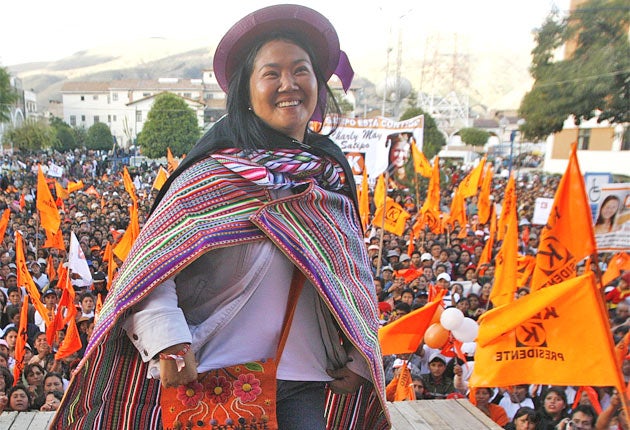Fujimori campaign raises fears for democracy in Peru
Jailed autocrat's daughter is on course to take the presidency

Your support helps us to tell the story
From reproductive rights to climate change to Big Tech, The Independent is on the ground when the story is developing. Whether it's investigating the financials of Elon Musk's pro-Trump PAC or producing our latest documentary, 'The A Word', which shines a light on the American women fighting for reproductive rights, we know how important it is to parse out the facts from the messaging.
At such a critical moment in US history, we need reporters on the ground. Your donation allows us to keep sending journalists to speak to both sides of the story.
The Independent is trusted by Americans across the entire political spectrum. And unlike many other quality news outlets, we choose not to lock Americans out of our reporting and analysis with paywalls. We believe quality journalism should be available to everyone, paid for by those who can afford it.
Your support makes all the difference.For someone who has not been seen or heard in public for more than a year, incarcerated former president Alberto Fujimori is casting a long shadow over the campaign to choose Peru's next leader.
The disgraced autocrat is believed by many Peruvians to be orchestrating the campaign of his daughter, Keiko, from the jail where he is serving a 25-year sentence for embezzlement and directing paramilitary death squads. Running on a hard-right law and order agenda, Ms Fujimori is the favourite to win a run-off election on 5 June.
The 35-year-old congresswoman has built up a consistent but narrow lead over her left-wing rival, the former army lieutenant-colonel Ollanta Humala, whose economic plans to favour the poor scare wealthier voters.
Yet many fear that a victory for Ms Fujimori would see her free her father and effectively hand him the reins of power, reopening a dark chapter of Peru's history, which saw extrajudicial killings and corruption, and culminated with Mr Fujimori fleeing the country in 2000.
An apparent campaign of intimidation against journalists and activists has heightened those concerns. The writer Mario Vargas Llosa said this week that the harassment heralded more serious abuses should Ms Fujimori win the presidency just "as swallows announce spring".
Mr Vargas Llosa criticised Ms Fujimori for surrounding herself with the same advisers who formed her father's inner circle during his time in power "except for the ones in jail for being murderers and thieves" and accused Mr Fujimori of directing his daughter's campaign.
Investigations by the Peruvian newspaper La Republica have revealed a heavy flow of visitors, including lorries carrying campaign materials, to Barbadillo, the 72-year-old former autocrat's jail, where he is the sole inmate. The people guarding the gates are not warders but Fujimori supporters.
The paper detailed how John Kayser, the police officer in charge of security at Barbadillo, was removed from his post for refusing to relax regulations. Major Kayser, who participated in the 1992 arrest of the Shining Path leader Abimael Guzman, was then sent to work at Castro Castro, a maximum security prison housing terrorist convicts, where he was a "potential target" for prisoner retribution. The National Police of Peru was unavailable for comment.
Critics claim the revelations show that the outgoing government of President Alan Garcia's APRA party has developed a non-aggression pact with Ms Fujimori's movement. Mr Garcia has denied the suggestion, but both politicians have lurched from one corruption scandal to another and have a shared interest in avoiding the criminal investigations that some in Mr Humala's party promise.
Meanwhile, the menacing backdrop to Ms Fujimori's campaign has intensified. Cesar Levano, editor of the left-leaning tabloid La Primera, has been sent funeral wreaths, while Soledad Piqueras, an organiser of an anti-Fujimori group and the Facebook page, says she has received telephone death threats and dead rats delivered to her home.
The Fujimori team has been hit by the forced departures of three spokespeople. One was sacked after appearing to suggest that the judge who presided over Mr Fujimori's 2009 trial after his return to Peru would be answerable for his actions. Another went after effectively admitting that innocent people had died in the war against Shining Path.
Ms Fujimori is engaged in a delicate balancing act between claiming credit for her father's achievements while avoiding blame for his abuses. She has backed away from earlier statements that she would pardon her father, but 64 per cent of Peruvians do not believe her, according to one recent poll.
"There is no doubt that freeing her father is one of her top priorities but she will probably not try to do it straight away," said the political analyst Eduardo Dargent, adding: "Many in the Fujimori movement have a desire for revenge. They will start out cautiously but if they see that the administration is going well, then I think we will see them make their move. We are facing a dangerous moment for Peruvian democracy."
Join our commenting forum
Join thought-provoking conversations, follow other Independent readers and see their replies
Comments